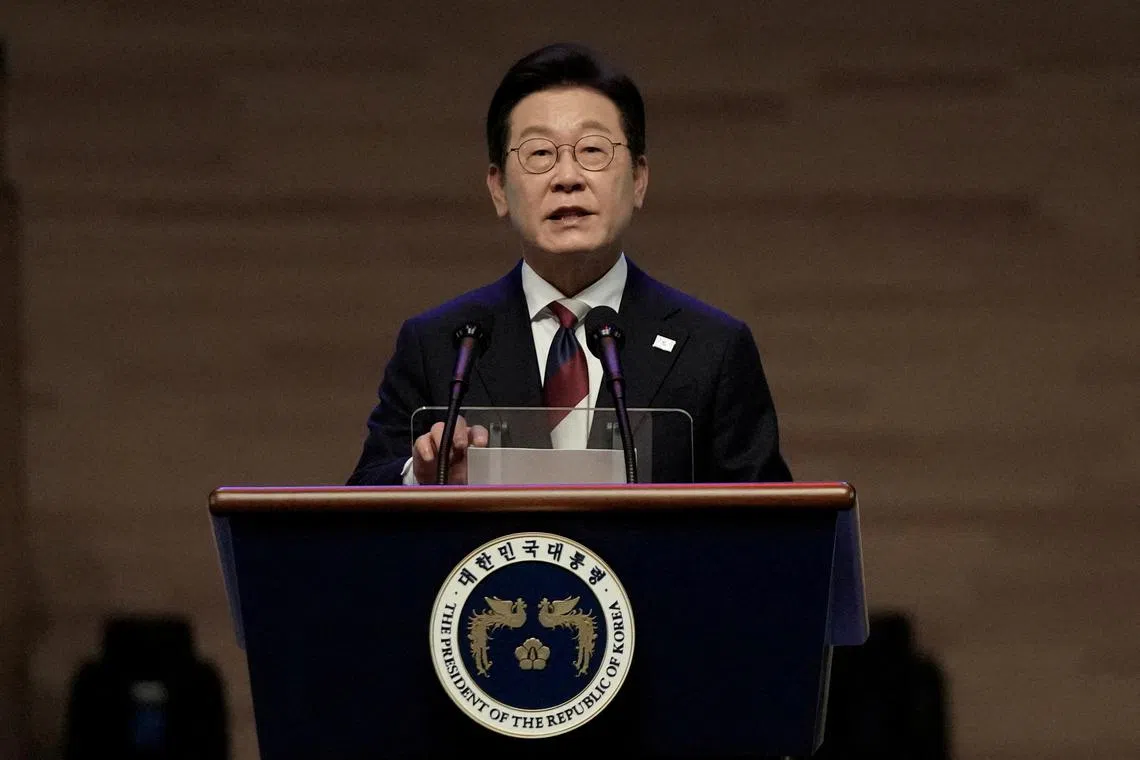South Korea’s Lee faces pivotal test at first summit with Trump
Sign up now: Get insights on Asia's fast-moving developments

South Korea's President Lee Jae Myung will seek to make a good impression and connect personally with Mr Donald Trump.
PHOTO: REUTERS
WASHINGTON/SEOUL – South Korea’s President Lee Jae Myung faces a pivotal moment on Aug 25 when he meets US President Donald Trump in Washington for their first summit, as the countries’ decades-old alliance strains to tackle rapid geopolitical changes.
Much is riding on the meeting for Mr Lee, who took office in June following a snap election called after his conservative predecessor – feted in Washington for his hard line on North Korea – was removed for attempting to impose martial law.
South Korea’s economy relies heavily on the US. Washington underwrites the country’s security with troops and nuclear deterrence, and Mr Lee hopes to chart a balanced path of cooperating with the US while not antagonising top trade partner China.
As he headed to the US, Mr Lee sent a special delegation to Beijing, which delivered a message calling for normalised relations with China that have been strained in recent years.
South Korea has long come under targeted criticism from Mr Trump, who has called it a “money machine” that takes advantage of American military protection.
Mr Lee will seek to make a good impression, connect personally with Mr Trump and, above all, avoid any unpleasant surprises, analysts said.
“For Lee, a no-news summit I think would be good,” said Mr Victor Cha of the Centre for Strategic and International Studies.
However, Mr Cha said what Mr Trump’s aides produce for him to talk about at the meeting may be completely different from what the US leader wants to talk about.
As part of his preparations for the summit, Mr Lee told reporters during his flight to Washington that he had read Trump: The Art Of The Deal.
Under heavy pressure from Mr Trump’s administration, South Korean negotiators secured a last-minute deal in July to avoid the harshest of tariffs but must still hammer out details of billions of dollars in promised investments.
South Korean officials say they hope such working-level trade negotiations will largely be left for other meetings.
“There are many major topics in the security field,” Mr Lee’s top policy aide Kim Yong-beom has said.
“Our position is that trade was already finalised last time. We hope that specific implementation plans for trade won’t be included in the summit at all, or at least should be kept simple if discussed.”
Several top officials, including the foreign minister, rushed to Washington over the weekend to try to iron out final details.
Mr Lee, who arrived in Washington on Aug 24, will highlight some of South Korea’s expected investments when he visits a shipyard in Philadelphia owned by the country’s Hanwha Group after the summit.
Cooperation to help the ailing US shipbuilding sector is part of the broad tariff agreement reached between the countries.
Engaging North Korea
Mr Trump is expected to pressure Mr Lee to commit to more spending on defence, including potentially billions of dollars more towards the upkeep of 28,500 American troops stationed in South Korea.
Mr Wi Sung-lac, Mr Lee’s top security adviser, said South Korea was in talks with Washington on Seoul’s higher defence spending, taking as a reference Nato’s agreement on a big new defence spending target.
Mr Wi added that the government was also looking into a plan for the purchase of American weapons.
Dr Duyeon Kim, from the Centre for a New American Security, said to avoid any public splits, the leaders should focus on reaffirming longstanding alliance principles and broadly agreeing to expand cooperation in all areas.
While focusing on increasing military spending, Mr Lee will likely seek to avoid conversations about a potential reduction of US troops or using them for a wider range of operations, or details on modernising the alliance, she said.
“They should leave those topics for working-level officials to hash out,” Dr Kim said. “Ambition could backfire.”
Mr Lee said it is difficult for Seoul to accept the demand by the United States to adopt “flexibility” of operating the US military now stationed in South Korea, Yonhap news agency reported on Aug 25.
Mr Trump and Mr Lee may also discuss efforts to persuade North Korea to freeze and eventually abandon its nuclear weapons programme. Both leaders support engaging Pyongyang, and Mr Lee has called for a phased approach to denuclearisation.
North Korean leader Kim Jong Un says South Korea and the US remain hostile to his country, adding that he will never give up his nuclear arsenal.
Over the weekend , Mr Kim supervised the test firing of new air defence systems.
Before Mr Lee’s US trip, the South Korean leader travelled to Tokyo to meet Japanese Prime Minister Shigeru Ishiba on Aug 23 to underscore the importance of cooperation between South Korea, Japan and the US.
A commentary carried by North Korea’s state media on Aug 25 criticised Mr Lee’s “despicable” trip to Tokyo as a “begging message towards the master of the White House” by highlighting trilateral military cooperation.
Mr Lee and Mr Ishiba discussed relations with Washington and US tariff issues and the Japanese leader shared his experience with Mr Trump, which for Seoul was useful information before Mr Lee’s first meeting with Mr Trump, said Mr Wi, the South Korean security adviser. REUTERS


